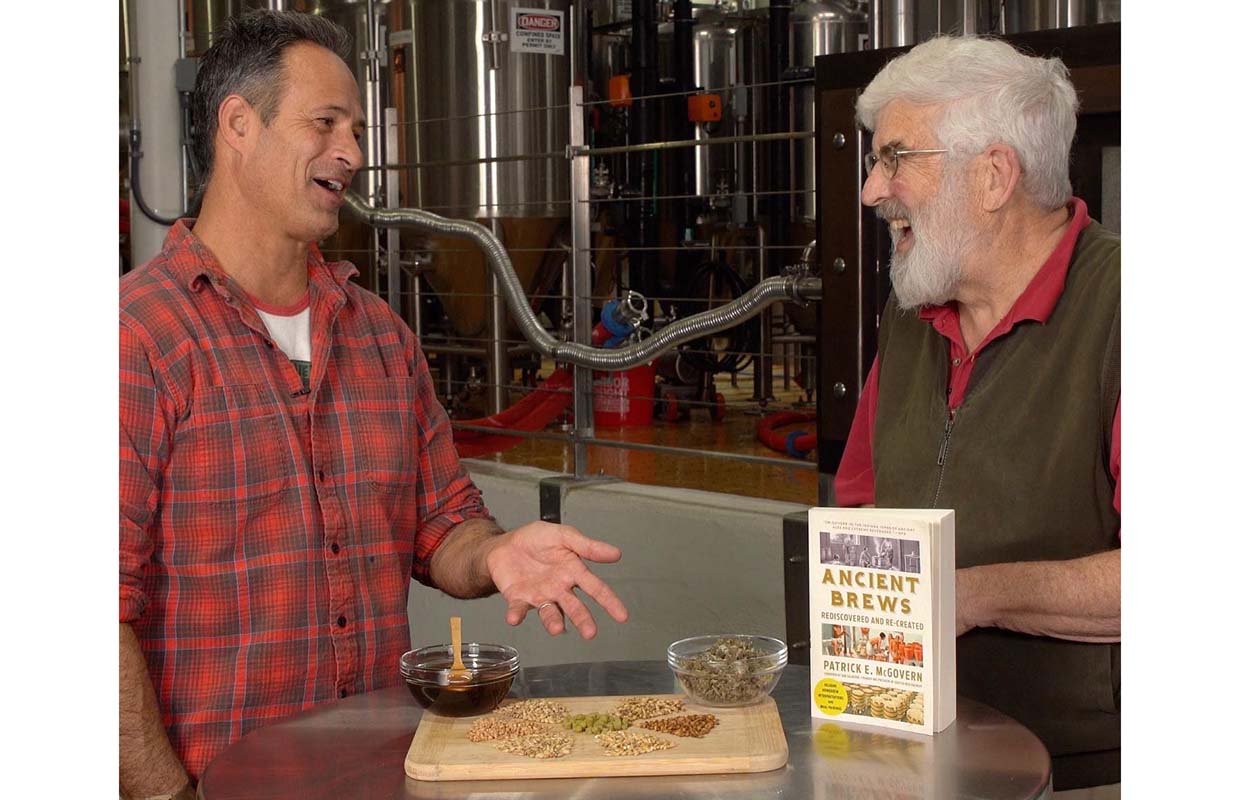
Dogfish Head Craft Brewery, in collaboration with Dr. Pat McGovern, scientific director of the Biomolecular Archeology Project at the University of Pennsylvania Museum in Philadelphia, and the Technical University of Munich Research Center Weihenstephan for Brewing and Food Quality (TUM RSW BLQ), debuts Tree Thieves, a modern take on an ancient Celtic gruit-style beer, a fermented beverage the ancient Celts crafted in southwest Germany as early as the 6th millennium B.C.
Clocking in at 6.5% ABV, Tree Thieves is brewed using superheated rocks, flavored with botanicals and honey, and fermented using yeasts “thieved” from the sacred trees of the early denizens of southern German (formerly Celtic) forest regions. The result is a dark, copper-brown beer with aromas of dark fruit, sage, chamomile, smoke and honey. The beer’s aromas are complemented by lightly smoky and slightly tart flavors of toffee, dark caramel, herbs, bread crust, stewed fruit and sweet honey. Releasing on Friday, Dec. 16, Tree Thieves will be available for $15 per 500ml bottle (only 600 available) exclusively at Dogfish Head’s coastal Delaware locations, the Tasting Room & Kitchen in Milton and Brewings & Eats in Rehoboth, while supplies last.
“It was great fun to work with Dr. Pat to resurrect yet another Ancient Ale together, and to have such an experienced and diverse group of experts involved with this historically significant collaboration made it extra poignant,” said Dogfish Head Founder & Brewer, Sam Calagione. “It’s fair to say we are now collectively as thick as thieves.”
The History & Brewing Team Behind Tree Thieves:
Archeological, archaeobotanical and other scientific investigations show original Celtic gruit-style beers likely contained honey and malts kilned over wood fires. Instead of hops, botanicals like carrot seed and mugwort were used to bitter the beer. To facilitate mashing and boiling, two integral steps in the beer brewing process, early beverage makers used rocks made hot over a fire. The wort was then transferred into wooden and/or metal vessels for fermentation. If wooden vessels were used, then natural yeasts and bacteria associated with the wood caused spontaneous fermentation, which – in this case – presumably resulted in a somewhat dark and smokey beer with notes of honey and herbs, alongside a slight sourness.
To remain as true-to-history as possible, Dogfish Head assembled a team of brewing experts to craft Tree Thieves, including Dr. Pat McGovern to assess the archeological and other scientific evidence, and brewing scientists Dr. Martin Zarnkow and Dr. Mathias Hutzler from the Technical University of Munich RCW to offer historical insight and help source the beer’s yeasts. Rounding out the team are The Boston Beer Company’s Technical Director for Brewing Innovation, Dr. Urs Wellhoener, Microbiologist and resident yeast expert, Dr. Justin Schilling, longtime Dogfish Head Brewmaster, Mark Safarik, and of course, Dogfish Head Founder & Brewer, Sam Calagione. Together, the group landed on the following ingredients for inclusion in Tree Thieves: a medley of German malts, honey from beehives in southern Germany’s Alpine Forest region and three locally harvested German yeast strains from flora held sacred by the Celts, oak trees, ash trees and mistletoe. A nod to the way the beer’s yeasts were harvested, the name Tree Thieves not only references the beer’s yeasts being “stolen” from trees, but it is a loving gesture to the scientific name for mistletoe, Phoradendron, meaning “thief of trees.”
Tree Thieves, the 10th Beer in Dogfish Head’s Ancient Ales Program:
“Our ancient Celtic brew represents the apotheosis of our Ancient Ales program, the first of its kind, that Sam and I began over 20 years ago,” said Dr. Pat McGovern. “Tree Thieves, the tenth in the series, has similar origins to our first and most awarded brew, Midas Touch. Both are extreme fermented beverages — combining barley, wheat, honey and native herbs — that ultimately derive from Indo-European cultures of the Neolithic period, some 6,000 to 8,000 years ago. Although Gordion in central Turkey, home to Midas Touch, is separated by over 1,500 miles from Hochdorf in southwest Germany that provided the main inspiration for Tree Thieves, the archeological and other scientific evidence for the re-creations of both brews came from huge burial mounds (so-called tumuli) for the rulers, who were ushered into the afterlife with funerary feasts highlighted by serving very similar mixed beverages in magnificent metal vessels.”
Archeological evidence proves that humans worldwide have been brewing beers and other fermented beverages for thousands of years, utilizing native fruits, vegetables, herbs and spices to concoct delicious beverages unique to their histories and regions. As one of the first modern craft breweries committed to brewing the majority of its beers with culinary ingredients outside the Reinheitsgebot, the German purity law that states beer must be brewed with only water, hops, malt and yeast, Dogfish Head has long worked to shine a light on the world’s earliest fermented beverages through a series of beers dubbed “Ancient Ales.” Dogfish Head’s Ancient Ales are off-centered reimaginings of the world’s first fermented beverages, for which the brewery has partnered with Dr. Pat McGovern, who has traveled the world collecting samples from inside well-excavated and well-dated ancient vessels used for making, storing, transporting, serving and drinking ancient beverages. Applying the latest chemical and other scientific techniques, he and his colleagues analyzed the contents of those vessels with a goal to determine the beverages’ original ingredients and recipes, and then retro-engineer facsimiles as close to the original drinks as possible. The resulting “liquid time capsules” are meant to transport the drinker “Back to the Future.”
Celebrating Tree Thieves at Dogfish Head’s Delaware Locations:
To celebrate the launch of Tree Thieves, Dogfish Head will host a special Ancient Ales chat on Friday, Dec. 16, at 6 p.m., at the brewery’s Milton Tasting Room & Kitchen. Both Sam Calagione and Dr. Pat will be in attendance to discuss their longtime history of collaboration and the creation of Tree Thieves. And for those that can’t get enough of Dogfish Head’s Ancient Ales, the brewery will offer an exclusive, weekend-long package at its beer-themed, harbor-front hotel, the Dogfish INN. Purchase of this package includes access to the Ancient Ales chat, as well as a private brewery tour, dinner at the brewery’s seafood restaurant and cocktail spot, Chesapeake & Maine, a copy of Dr. Pat McGovern’s latest book, Ancient Brews Rediscovered and Re-created (a panoramic, insider’s view of how the first nine ancient ales came about), and more. More regarding programming and tickets can be found at www.dogfish.com/events.
For more on Dogfish Head, Dr. Pat McGovern’s research and the Technical University of Munich RCW, please visit www.dogfish.com, www.penn.museum/sites/biomoleculararchaeology, and www.blq-weihenstephan.de/en/, respectively.






Be the first to comment